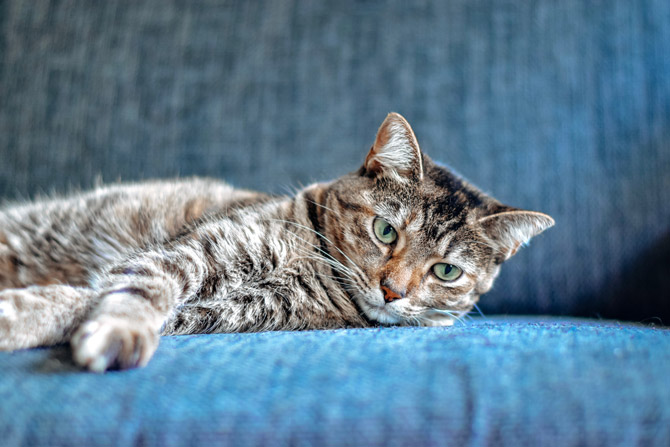The American Society for the Prevention of Cruelty to Animals (ASPCA) reports that feline dementia affects more than 55% of cats aged 11-15 years, and more than 80% of cats aged 16-20 years. These are pretty high statistics; especially given the average lifespan of indoor cats nowadays is 12-15 years.
In fact, International Cat Care says cats live much longer now than compared to 20 years ago. So much so that cats’ life stages have been redefined. It states, ‘cats are considered to be elderly once they reach 11 years with senior cats defined as those aged between 11-14 years and super-senior cats 15 years and upwards.’
Even just conveying this information can be useful for cat owners. It can also be helpful to talk about some of the effects of ageing on cats. Assisting cat owners to recognise and accept that as their cat matures he or she will need extra care can help ensure cats live a long and happy life.
Discussing feline dementia
Indeed, many cat owners may never have heard of feline dementia (feline cognitive dysfunction), which may cause them to miss the signs. As such, simply having a conversation and educating cat parents can be really helpful and will increase the likelihood they will recognise their cat needs help.
You can explain that feline dementia reduces cats’ learning ability, affects their memory and can cause spatial disorientation and general confusion. As a result of these cognitive changes, a cat’s behaviour and habits may alter.
Common signs of feline dementia include:
- Urinating or defecating outside the litter box
- Seems disorientated
- Has difficulty navigating spaces
- Grooms less
- Loses appetite
- Seems irritable
- Becomes more vocal
- Sleeps more during the day and wakes more at night
Certainly, some of the symptoms may be indicative of a different health issue, for example; the cat may have hearing loss, reduced vision or arthritis. The important message to promote is if an owner recognises any unusual symptoms in their cat or suspects feline dementia, it’s important to visit their vet.
Supporting a cat with feline dementia
While there is no cure for feline dementia, pet owners can be encouraged to change a few environmental factors to assist their kitty.
Environment adjustment
Educating cat owners on the changes they can make to their cat’s environment to help lessen their feline friend’s stress can be useful. Easy adjustments include:
Placing down multiple food/water bowls (i.e. in different areas of the home so it’s easy for the cat to access). Owners should be aware of not overfeeding their cats when doing this.
Increase the number of litter trays in the home and ensure the sides are low.
Cordon off a safe and comfortable area for the cat. Reducing the size of the cat’s space may help make it easy to navigate and find important things, like their bed, litter tray, food and water.
Environment enrichment
There are many things cat owners can do to exercise their meowing mate’s brain. You might suggest they introduce puzzle feeders, as these can be fun for cats but they also stimulate cats’ minds.
They can also try introducing new toys and increasing the amount of time they spend playing with their cat. Great mind-related games to play include hide and seek, food foraging, puzzles and treasure hunts. Cats love playing and mind games are a great way to keep cats active, engaged and happy.
Treatment
Feline dementia cannot be cured, but you may like to chat to cat owners about the medicines available to help manage and perhaps slow its progression.
Administering medicine may help to prevent dopamine breakdown in the brain, which is an integral factor in the development of feline dementia. Propentofylline may be recommended to assist in improving blood flow to the brain. Furthermore, because feline dementia can cause anxiety in cats, antidepressant and anti-anxiety medicine, such as Adaptil, may be helpful.
Antioxidants can help reduce free radical damage, while omega-3 fatty acids, S-adenosyl-L-menthionine and L-theanine (obtained through diet or supplements) are thought to be beneficial.
Encourage cat owners to chat to their vet about the various medicines to work out which one might be best to help reduce or manage their cat’s symptoms.
Latest posts by Liz Walden (see all)
- Pet health: Medicinal cannabis for pets - December 27, 2021
- What pet business insurance do I need? - November 17, 2021
- Pet sitters: how to take time off - November 15, 2021










Please please please do not sadden or provoke unreasonable upset to elderly cats – dementia can happen after α sometimes unexpected grief & sorrow the cat may go through…. This can include yelling and arguing on a daily basis inside a household. Unfortunately my cat got dementia and it is so sad. After 14 years she does not even recognize our home or ourselves and instead lives outside, when she is at her most frail age. Now I know the constant arguing with my partner and the subsequent scares the animal experiences is to blame to a great extent…